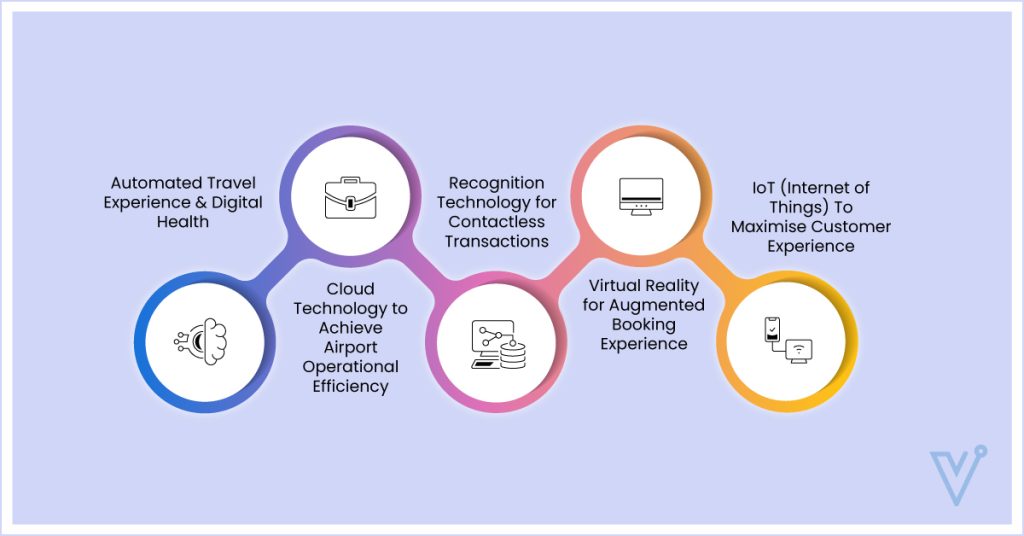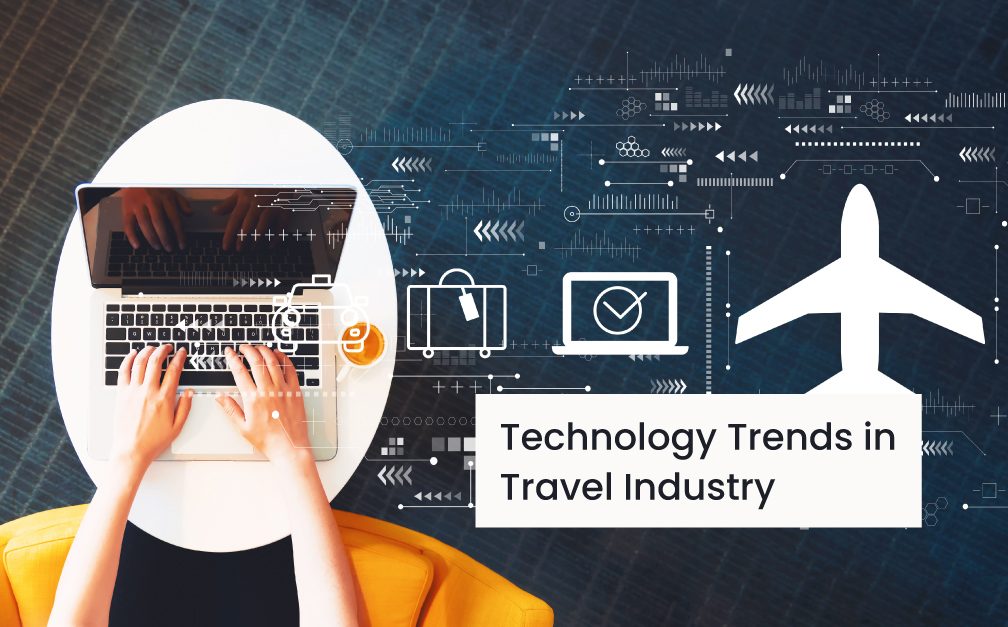The pandemic jolted almost all sectors barring a few like pharma in the economies across the world. Some industries were actually fighting for survival; the hospitality and travel industry was one of them. As per the International Labour Organization’s report of the total job losses during the pandemic, one-third were from the hospitality sector. The same report estimates 1.6 million people in the travel and hospitality sector lost jobs in the Asia-pacific region alone.
However, now the travel industry is slowly and steadily gaining momentum. Despite many covid-protocols in place, it’s again the technology helping the travel industry to operate efficiently. And enabling it to offer the best possible customer experience through innovative technologies.
So, let’s look at five Technology Trends in Travel Industry enabling it to get the ball rolling again.
Five Leading Technology Trends in Travel Industry Today

In an effort to get the travel industry back on its feet, the World Travel and Tourism Council is urging governments around the globe to either remove or simplify visa restrictions, cut down travel taxes and provide incentives to traveling. At the same time, some Technology Trends in Travel Industry are also coming to the fore, making a recovery from the pandemic lump easier. The following five are a few examples of these:
#1 Automated Travel Experience & Digital Health
During the pandemic, countries around the globe slashed airport development and airline technology budgets, but now both public and private players in travel are increasingly investing in passenger processing automation.
Due to the pandemic travel guidelines, the processing time at airports increased considerably – the exercise demotivates casual travellers. That’s when automated passenger processing was needed, and now airports are using biometric technology to combat this issue of hesitancy among travellers.
Also, there is a great deal of talk in the travel industry about standardizing and digitizing health verification, which further increases operational efficiency. SITA, one of the world’s leading air transport communication and technology experts, recently announced that it is making a Digital Travel Declaration, which allows travellers to submit health documents ahead of their travel date. And the solution would be available to all the governments free of cost.
Also Read – Why Apartment Mapping is the Need of the Hour for Travel Agencies in 2024
#2 Cloud Technology to Achieve Airport Operational Efficiency
As discussed in the previous pointer, operational efficiency and scalability are becoming a significant concern for airports amid the changing dynamics of the pandemic, and it’s challenging their existing business models.
Therefore, all the major airports worldwide are now looking towards leaner operation and maximizing ancillary revenues. Cloud technology is a crucial investment area, where airports have to pump more money to make this model sustainable and prepare for fluctuating passenger numbers.
Also, all major airports are planning to deploy more business intelligence units to manage flight operations and asset management.
#3 Virtual Reality for Augmented Booking Experience
The world is looking at virtual and augmented reality as the future of travel. People can also visit areas where climatic conditions for humans are so adverse that they cannot visit them physically.
On the other hand, augmented and virtual reality has a lot to offer to the travel industry of current times. It allows travellers to tour places and attractions virtually before booking tickets or adding those places to the actual itinerary. Many online travel agencies are already offering these virtual and augmented tours to their customers.
Recommended: Future of Artificial Intelligence in Travel Technology
#4 Recognition Technology for Contactless Transactions
When the focus is on minimal human interaction, recognition technology becomes critical for the travel industry. We mentioned using biometric technology to facilitate airport operation; it is also a subset of recognition technology.
The technologies like facial recognition, fingerprint sensor, retina recognition come under the broad umbrella of recognition technology, and they all role to play in contactless travel transactions. For example, JetBlue airports in the US use facial recognition technology for identity checks, completely eliminating the need for boarding passes. Similar experiments are happening worldwide, and they are successful – Japan’s Henn-na hotel, the world’s first robot staffed hotel, uses recognition technologies like voice and facial recognition to attend guests.
#5 IoT (Internet of Things) To Maximise Customer Experience
IoT is an internet-based connection among devices, letting them share data with one another. Internet of Things for the tourism industry means furthering customer satisfaction. IoT unlocks next-level personalization. Hotels are using in-room tablets and screens to allow guests to increase/decrease room temperature, turn on/off the heater, and schedule wake-up calls.
Moreover, the use of smartphones for IoT is one of the leading Technology Trends in Travel Industry. It allows guests to navigate hotels and airports quickly. Some hotel chains are offering keyless entry/exit with smartphone integrations. Also, airports use smartphone sensors to push luggage information to a person’s phone automatically.
Recommended: 3 Ways Metaverse Can Impact Accommodation Industry
The travel industry is picking up pace again with the wave of Technology Trends in Travel Industry mentioned above. And this time, it’s more prepared and equipped to deal with unforeseen challenges like Covid-19 Pandemic.







